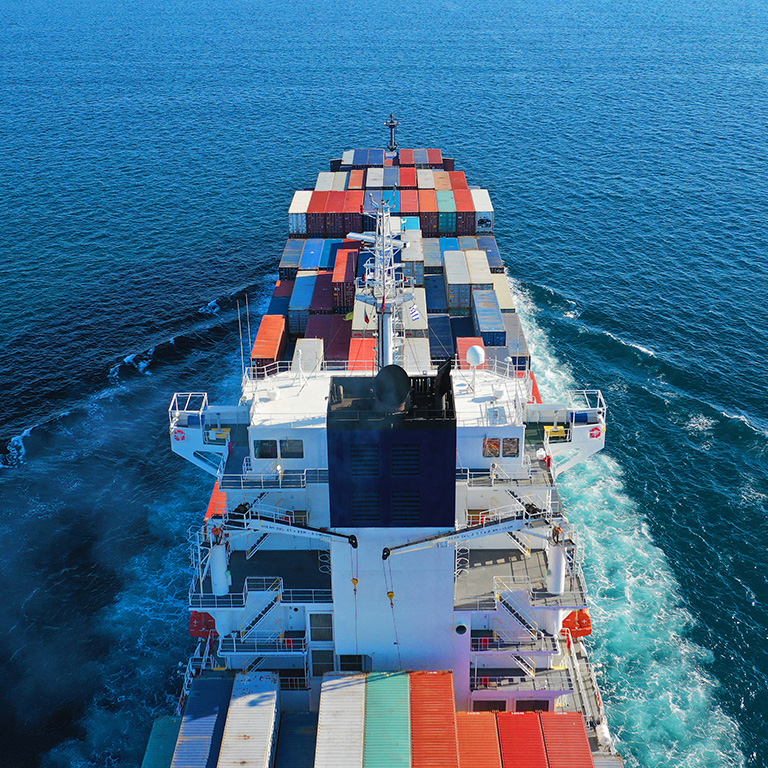
By Stephen Harris ,
Senior Marine Technical Consultant
15/01/2024 · 6 minute read
The COP28 summit closed with a deal to transition away from fossil fuels for the first time, signifying a critical moment for global climate negotiations. While the COP agreement does not directly reference shipping, it calls for hard-to-abate sectors to accelerate the adoption of alternative technologies and fuels. In addition, from January 2024, the EU’s Emissions Trading System (ETS) was extended to cover carbon dioxide emissions from all large ships, steering the sector towards progress in its decarbonisation efforts.
The commercial maritime industry is a vital part of the global economy, transporting more than 80% of goods around the world. According to Clarksons' data, global fleet tonnage has increased by 97% since 2008, and maritime trade continues to grow at around 3% yearly. At present, the majority of engines that drive the world’s traditional commercial vessels are fuelled by fossil fuels that include marine diesel oil (MDO), intermediate fuel oil (IFO), and marine gas oil (MGO). In 2021, more than 93% of vessels at sea (by tonnage) ran on these fuels. Developments are underway as the sector considers the use of alternative fuels.
Alternative fuels include methanol, liquefied natural gas (LNG), liquefied petroleum gas (LPG), biofuels, ammonia, hydrogen, electric, wind, sail, and nuclear power. In some cases, these fuels may be used as a “dual fuel” mixed with a small amount of traditional fuel to improve their ignition performance. Each fuel has advantages and disadvantages, presenting scientific and commercial challenges and risks for vessel operators, charterers, and insurers.
Several alternative fuels are carbon-based, such as methanol and LNG. While such fuel types may produce fewer emissions compared to traditionally fuelled ships, they are generally viewed as a temporary, transitional solution, whereas non-fossil carbon-based sources, such as biomass, may be more sustainable.
Vessels that continue to use carbon-based alternative fuels will face emission charges. Under the EU’s ETS, carbon credits must be purchased to pay for emissions created by carbon-based fuels during voyages within as well as to/from Europe from elsewhere in the world. Some non-carbon-based alternative fuels such as ammonia and hydrogen need to be blended with small amounts of traditional fuel during the combustion process (as dual fuels) to spark engine ignition and, therefore, will also require carbon allowances.
Furthermore, the cost of many alternative fuel types will likely be higher than traditional fuel oil initially. This concerns many vessel charterers, who are usually contractually obliged to pay for the fuel consumed while the vessel is under charter.
Additional concerns relate to supply. If a vessel is designed or retrofitted to run on an alternative fuel type, there must be adequate global fuel supplies and refuelling infrastructure wherever that vessel trades. It is unlikely that all alternative fuels will be adopted and/or supplied globally. A shipowner who chooses a fuel type that few others in the industry adopt may find it challenging to secure adequate supply of that fuel. This could also impact the vessel’s resale value if purpose built or retrofitted for a particular fuel type.
If the supply of a fuel type is unavailable, commercial vessel engines and alternative rotor propulsion systems (such as a Flettner rotor sail propulsion system, which could reduce a ship’s energy consumption) may operate using a mixture of different fuel types. However, a vessel running on more than one fuel has its own challenges, such as different storage and conditioning systems.
The operation of alternative fuel-powered vessels may present risks that have not yet been fully quantified and assessed by insurers and/or underwriters. As of yet, hydrogen is mainly untried and untested in a marine environment. Nuclear-powered commercial cargo vessels could be a technically viable alternative to traditional sources of energy, however, there are some concerns regarding the safety of nuclear material sailing internationally through the open seas. While electric vehicles are fast becoming a reality for millions of people around the world, whether batteries can power large commercial vessels at sea and for long periods of time is still unclear. The emissions generated during the production of batteries required to power a large commercial vessel are also a matter of concern.
Ammonia can be toxic and highly caustic if not handled correctly, posing a hazard to crews, marine life, and the engine. Ammonia, LNG, and hydrogen require energy to be kept at very low temperatures in a liquefied state (e.g., ammonia at –33O C, LNG at –162O C, and hydrogen at -273O C) and, as such, may present additional loading and storing challenges. New fuel types may also challenge storage facilities in some ports from a security and physical damage perspective. How these alternative fuels will perform under harsh maritime sea conditions over lengthy periods is also largely unknown.
There is much to be excited about, but also uncertainty surrounding the performance and safety of many alternative fuels, meaning the marine insurance market may take a cautionary approach. Insurers may look to manage and/or limit their exposure to losses arising from the use of alternative fuels in a number of ways, for example through the imposition of policy terms such as warranties, sub-limits, and/or exclusions.
The insurance industry has a significant role to play in supporting the maritime industry as it looks to invest in new technologies, considers alternative ways to operate going forward to reduce greenhouse gas emissions, and transitions to a lower-carbon future. Marsh’s Marine, Cargo & Logistics practice will continue to work with you and pursue risk transfer options that support your development and implementation of lower-carbon strategies.

Article
19/12/2025